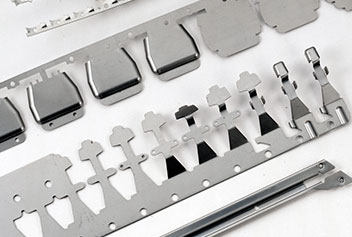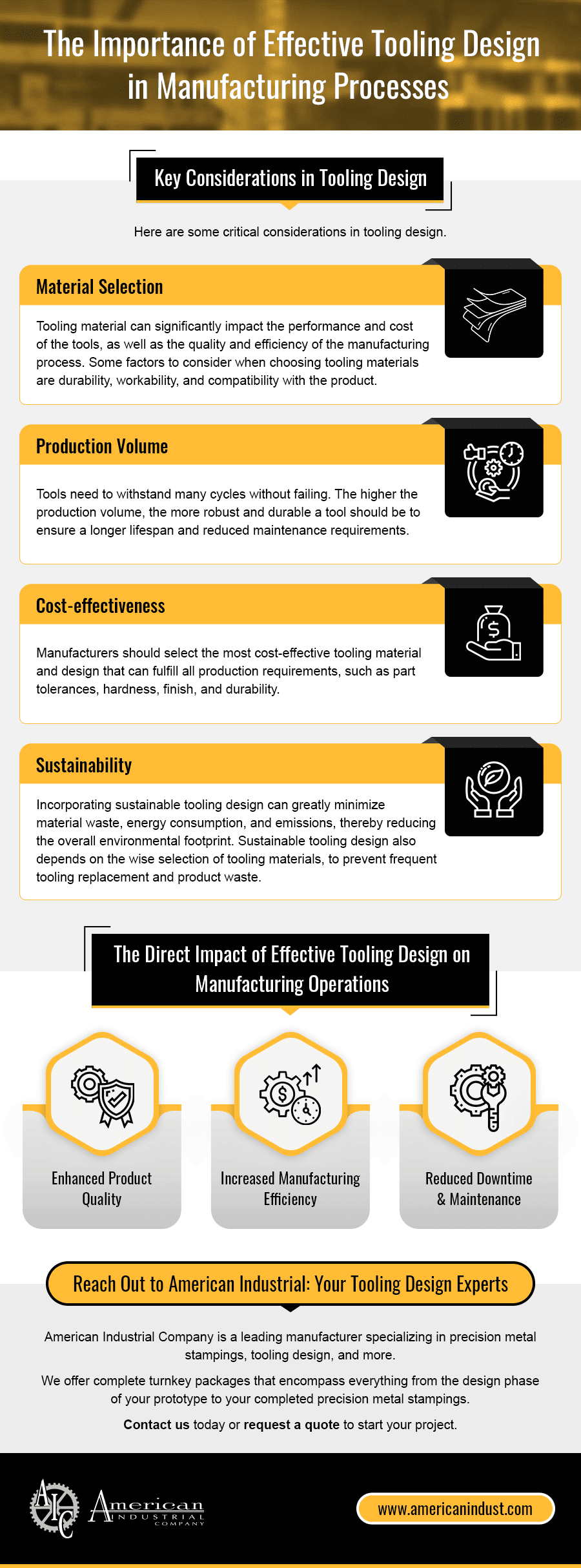On | By American Industrial

All manufacturing and molding processes require machine tooling, which is the process of building or producing various fixtures, jigs, and molds needed to create parts and products. Good tooling enables the creation of high-quality products, prolonging product longevity and guaranteeing proper functionality.
Generally, the tooling process tends to vary from one application to another, so understanding which tooling technique is ideal for specific items is crucial to producing consistently high-quality products. This blog discusses the benefits of effective tooling design in the manufacturing process.
Understanding Tooling Design
Tooling design refers to the plans and components that manufacturers use to make components or products. The design must consider a variety of manufacturing steps, such as raw material selection, the molding process, the machining process, and final assembly.
During the tooling design process, engineers use various cutting-edge processes like CAD/CAM technology, mold making, CNC machining, die casting, welding, heat treating, and more to create tools. Tooling design is an integral part of the product manufacturing process that affects the quality of the final product. An effective precision tooling design also streamlines manufacturing efficiency, especially for high-volume production runs.
Key Considerations in Tooling Design
Here are some critical considerations in tooling design.
- Material Selection: Choosing the suitable material(s) for tooling design is crucial for several reasons. Tooling material can significantly impact the performance and cost of the tools, as well as the quality and efficiency of the manufacturing process. Some factors to consider when choosing tooling materials are durability, workability, and compatibility with the product.
- Production Volume: When designing a tool, it is crucial to consider the production volume and required durability. High-volume production requires tools that are sturdy and resilient enough to stand up to long-term wear and tear. Tools need to withstand many cycles without failing. The higher the production volume, the more robust and durable a tool should be to ensure a longer lifespan and reduced maintenance requirements.
- Cost-effectiveness: The tooling cost is another crucial factor to consider because the condition of the tooling influences the quality of the finished part. Production speed and precision also depend on the quality of the tool. The right tool guarantees repeatability and accuracy across every part produced, so tooling design should balance these factors with cost. Manufacturers should select the most cost-effective tooling material and design that can fulfill all production requirements, such as part tolerances, hardness, finish, and durability.
- Sustainability: Tooling manufacturing processes can be resource-intensive. Manufacturers should strive to align their tooling design practices with the growing global emphasis on environmental responsibility and resource conservation. Incorporating sustainable tooling design can greatly minimize material waste, energy consumption, and emissions, thereby reducing the overall environmental footprint. Sustainable tooling design also depends on the wise selection of tooling materials, to prevent frequent tooling replacement and product waste.
The Direct Impact of Effective Tooling Design on Manufacturing Operations
Let’s look at some notable impacts of effective tooling design on manufacturing operations:
- Enhanced Product Quality: High-quality tooling design creates products with optimal durability and quality. Precise tooling ensures product consistency and reduces defects, thus increasing customer satisfaction.
- Increased Manufacturing Efficiency: Since every mass-produced product, component, and part is manufactured using tooling, the efficacy of each production stage can be influenced by the tooling’s price, quality, and lead time. Generally, well-designed and well-made tooling can streamline overall manufacturing efficiency.
- Reduced Downtime and Maintenance: An optimized tooling system helps reduce installation time and the overall cost of manufacturing processes. It also minimizes wear and tear, which reduces the frequency of replacements and maintenance. Reducing machine downtime positively impacts a company’s bottom line by increasing productivity, lowering costs, and contributing to overall competitiveness.
Reach Out to American Industrial: Your Tooling Design Experts
Effective tooling design is the cornerstone of modern manufacturing. It impacts the quality and cost-effectiveness of production and influences a company’s ability to adapt to changing market dynamics and maintain a competitive edge. Good tooling design can optimize material usage, reduce waste, and conserve resources. As market demands change, manufacturers need to invest in research and development for better tooling solutions.
American Industrial Company is a leading manufacturer specializing in precision metal stampings, tooling design, and more. We offer complete turnkey packages that encompass everything from the design phase of your prototype to your completed precision metal stampings. Contact us today or request a quote to start your project.



